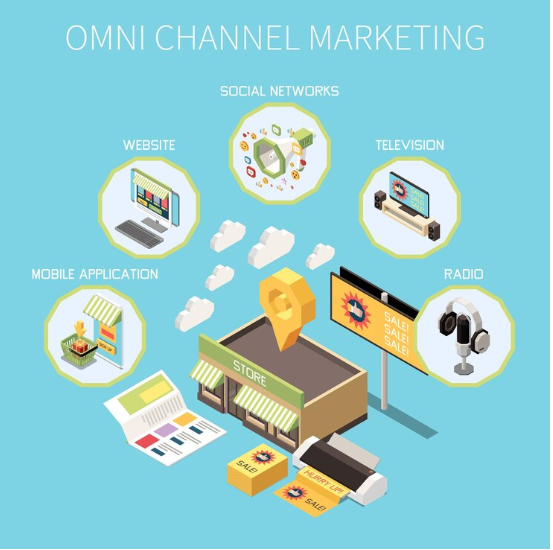
Businesses today are constantly seeking innovative ways to engage with their customers. With the rapid adoption of mobile devices clubbed with the rapid proliferation of social media platforms and mobile apps, customers today seek proactive support from businesses. They expect personalized, timely, and seamless interactions across all touchpoints. In response to these evolving expectations, companies are turning to omnichannel marketing strategies powered by Artificial Intelligence (AI) to meet and exceed customer demands.
What is Omnichannel Marketing?
Omnichannel marketing is an integrated approach that ensures a seamless customer experience across multiple channels. The prefix “omni” means “all,” and “channel” is a reference to the many ways customers might interact with a business. This could include in-person visits, phone calls, emails, social media interactions, mobile apps, and more.
For example, a customer might start by browsing products on a company’s website, then move to a mobile app to make a purchase, and later visit a physical store to pick up their order or seek further assistance. Throughout this journey, the customer expects a consistent and personalized experience and omnichannel marketing is all about making this possible in the best possible way — be it B2B, B2C, D2C business.
Increasing Role of AI in Omnichannel Marketing

While omnichannel marketing is not a new concept, the rapid growth in AI technologies has sharpened its effectiveness and potential. AI’s ability to process and analyze vast amounts of data in real-time has equipped businesses to deliver a more personalized and cohesive customer experience across all channels, unlike anything before. Let’s examine some of the key ways in which AI is now playing a major role in delivering an omnichannel experience:
- Enhanced Personalization: AI algorithms can analyze customer data from various touchpoints to understand individual preferences and behaviors. This enables businesses to create highly personalized marketing campaigns, product recommendations, and content that resonate with each customer. Eg. Optimizely, Adobe Target
- Predictive Analytics: AI can predict future customer behaviors by analyzing past interactions and identifying patterns. This helps businesses anticipate customer needs, optimize inventory, and tailor marketing strategies to increase engagement and sales. Eg. Salesforce Einstein, Google Analytics 360
- Improved Customer Service: AI-powered chatbots and virtual assistants provide instant, around-the-clock customer support across multiple channels. These AI tools can handle a wide range of inquiries, from answering FAQs to assisting with purchases, ensuring a seamless customer service experience. Eg. Kommunicate, Zendesk, Intercom
- Automated Marketing Campaigns: AI automates the execution of marketing campaigns, including email marketing, social media posts, and ad placements. This not only saves time but also ensures that customers receive timely and relevant messages based on their interactions and behaviors. Eg. Mailchimp, Hubspot, and Marketo Engage
- Seamless Integration Across Channels: AI helps integrate various channels by providing a unified view of the customer journey. This ensures that all customer interactions are interconnected, allowing for a seamless transition between online and offline experiences. Eg. Zapier, Segment, Mulesoft
👉 Click here to learn some of the best Omnichannel Customer Experience Tools of 2024
Some Examples of Successful Omnichannel Marketing
Several companies have successfully integrated AI into their omnichannel marketing strategies. Let’s look at some examples:
1. Starbucks

Starbucks has effectively used AI to enhance its omnichannel marketing efforts. The company’s mobile app, which integrates with their loyalty program, uses AI to analyze customer preferences and purchase history. This enables Starbucks to offer personalized recommendations and promotions to its customers. The app also allows customers to order and pay ahead, making the in-store experience seamless and efficient.
2. Amazon

Amazon is a pioneer when it comes to using AI for omnichannel marketing. The company employs AI algorithms to recommend products based on customers’ browsing and purchase history. Amazon’s Echo devices, powered by the AI assistant Alexa, provide a voice-activated shopping experience, integrating seamlessly with the company’s online store. Amazon’s Prime membership also offers a unified experience across its various services, including free shipping, streaming, and more.
3. Sephora
Sephora, a global beauty retailer, has leveraged AI to provide a personalized and interactive shopping experience. The Sephora Virtual Artist, an AI-powered feature on their mobile app, allows customers to try on makeup virtually. Sephora also uses AI to send personalized product recommendations and beauty tips through email and social media. Their omnichannel approach ensures customers have a consistent and engaging experience, whether they shop online or in-store.
4. Nike
Nike has successfully implemented AI to enhance its omnichannel marketing strategy. The Nike App offers personalized product recommendations and exclusive offers based on users’ preferences and activities. Nike also uses AI to optimize its supply chain, ensuring that popular products are always in stock. Their integration of online and offline experiences, such as the Nike Training Club app and in-store events, creates a cohesive and engaging brand experience for customers.
In conclusion..
Omnichannel marketing with AI is revolutionizing the way businesses engage with their customers. By leveraging AI to analyze data, personalize interactions, predict behavior, automate tasks, and enhance customer service, companies can provide a seamless and consistent experience across all channels. As AI technology continues to evolve, we can expect even more innovative and effective omnichannel marketing solutions in the future.
Omnichannel Marketing with AI was originally published in Chatbots Life on Medium, where people are continuing the conversation by highlighting and responding to this story.
